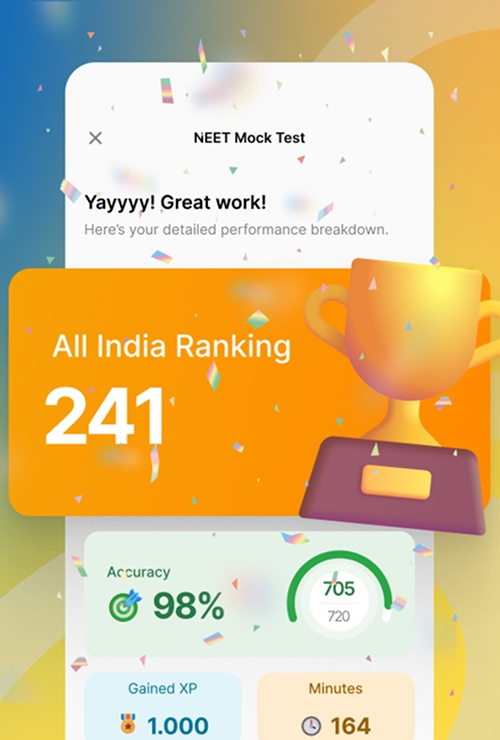
☝️ At a glance
- MBBS in foreign countries offers quality medical education with globally recognized degrees.
- Top medical universities abroad provide English-taught programs, affordable tuition fees, and advanced facilities.
- Studying MBBS abroad gives international students global exposure and access to world-class education.
- The admission process is simple, with scholarships, financial aid, and affordable fee structures available.
- Indian students need basic eligibility, NEET exam qualification, and follow National Medical Commission guidelines for MBBS programs abroad.
Studying MBBS abroad is an excellent option for Indian medical students who are unable to secure a medical seat in India. Many students also choose to pursue MBBS internationally to gain admission to top medical universities around the world. In 2024, a record total of over 2.38 million students registered for the NEET-UG exam. For those who do not qualify, private medical institutions often become the only option due to their high tuition fees.
Renowned medical universities, equipped with state-of-the-art facilities and world-class faculty, make studying MBBS abroad a popular choice among Indian students. This experience not only provides international exposure and the opportunity to practice medicine in a foreign country but also offers a holistic education that students cherish for a lifetime. So, which country is the best for MBBS studies? Let’s explore!

Become a global doctor with MBBS abroad!
Studying abroad can be affordable and stress-free with futureMBBS:
- World-recognized universities with English-taught programs
- On-site support in partner university cities
- Guaranteed placements & internships for hands-on experience
From selecting universities and supporting you with the application process to orientation and finding accommodation – we are at your side.
Why study MBBS abroad?
The MBBS (Bachelor of Medicine, Bachelor of Surgery) is a qualification that demands immense patience, hard work, and focus. Numerous countries, in addition to India, offer medical programs at competitive and often lower costs compared to private universities in India. Here are some key reasons why studying MBBS abroad can provide a great experience:
Best universities across the world
Universities and institutes abroad offer state-of-the-art facilities and modern amenities for a comprehensive educational experience. Students can study at top-ranking universities and work alongside Nobel laureates. These institutions provide world-class faculty and internationally recognized degrees, helping students excel in the global medical field. They also ensure student safety, allowing for a comfortable experience in a foreign environment while offering opportunities to learn about cutting-edge medical technology.
English-taught programs
Many colleges and universities around the world use English as their primary language of instruction and communication in medical programs to attract international students. This approach is advantageous for both international and Indian students. However, applicants should keep in mind that knowledge of the local language is always beneficial. Learning the local language can greatly enhance interactions with local people and help students adjust to living in a foreign country, even if the university conducts courses in English.
Better ROI
Pursuing an MBBS degree abroad is often as affordable or cheaper than attending private universities in India. Many countries offer lower overall costs, including visa fees, tuition, and accommodation. This financial benefit is a key factor for students choosing to study abroad. Additionally, graduates can practice in the host country, allowing them to earn significant income and achieve a better return on their investment over time.
Enough medical seats
Due to the limited number of government medical seats in India, there is extremely heavy competition and high tuition fees at private universities. As a result, many aspiring medical students find it challenging to pursue their dream of studying MBBS in India. In contrast, international universities have attracted these students by offering lower tuition fees, maintaining high educational standards, and providing a significantly larger number of seats than Indian government institutions.
Scholarships and financial aid
To encourage a steady flow of students pursuing medical studies abroad, universities and institutions have introduced various scholarships and financial grants. These initiatives aim to support students who wish to study MBBS in foreign countries. Additionally, several external agencies offer scholarships specifically for Indian students seeking higher education overseas. Students can explore a comprehensive list of scholarships available for pursuing MBBS studies abroad.
Eligibility requirements to study MBBS abroad for Indian students
Although each country may have its own rules and eligibility criteria for studying MBBS abroad, today we will discuss the general guidelines for Indian students who wish to pursue an MBBS degree in top overseas destinations.
The student must be at least 17 years old by December 31 of the year they are applying for admission. There is no upper age limit to apply for MBBS abroad.
The student must have completed his 12th education from a recognized board.
The student must have an aggregate percentage of at least 50% in Physics, Chemistry, and Biology, and must have studied English as a compulsory subject during their 10+2 education.
The candidate must submit a medical certificate upon admission, confirming that they do not have any contagious diseases.
Students must qualify the National Eligibility Entrance Test (NEET), even for medical studies abroad. The age limit for NEET is 25 years for General candidates and 30 years for SC/ST/OBC candidates.
Having clarified the eligibility requirements for Indian students pursuing MBBS abroad, let's now discuss the admission process for studying MBBS overseas.
Admission process for studying MBBS abroad
After the applicant has met the eligibility requirements for studying MBBS abroad, they can proceed to the next step: the application process. Candidates can refer to the steps below for a detailed admission procedure to universities overseas:
Step 1: Choose your preferred MBBS university abroad and review its eligibility criteria.
Step 2: Countries frequently need candidates to take an eligibility exam in order to be allowed to study there. To be qualified to apply, candidates might additionally need to take an English proficiency exam. To go to the next round, applicants must complete all of the examinations.
Step 3: Enter all your information accurately in the university's online application form, being careful not to make any mistakes or lie.
Step 4: The next step would be for applicants to provide scanned copies of a number of important academic documents in order to strengthen their profile even further. The documents are listed below.
Step 5: Pay the application fee.
Step 6: Upon successfully submitting their online application and paying the required cost, applicants will get an admission letter from the institution.
Step 7: In order to apply for a student visa, applicants must then send their passport, original documentation, and acceptance letter to the relevant embassy.
Step 8: Depending on how long it takes the embassy, the student visa will be issued. The candidate would next need to plan his travel arrangements so that he could go to his university prior to the start of his course.

Study medicine abroad with 100% support!
futureMBBS offers full support to make your dream of studying medicine abroad a reality.
- Hassle-free admission guidance
- Fast-tracked visa processing
- Post-arrival support, including accommodation assistance
Essential documents required for pursuing medical education abroad
During the admissions process, applicants who wish to study abroad would need to provide the following documents, among others:
Birth Certificate
Class 10th and 12th mark sheets
School Leaving & School Migration Certificate
NEET Score Card
Statement of Purpose
Letter of Recommendation
Resume (CV)
Personal Financial Statements
Passport Size Photographs
Medical Certificate
MBBS in abroad v/s MBBS in India
Studying MBBS in India and studying MBBS abroad share many similarities. The National Eligibility-cum-Entrance Test (NEET) is now required for admission to medical schools both in India and overseas. In India, the MBBS program lasts 5.5 years, which includes a one-year clinical internship. In contrast, MBBS programs abroad can take up to 6 years, which includes a year of clinical rotations.
Studying MBBS in another country offers students greater global exposure, access to large university campuses, better laboratory facilities, and a more favorable student-to-teacher ratio. Those who choose to study abroad can also work in the host country and potentially settle there long-term. Additionally, students can enjoy these benefits at a more affordable cost.
Students who complete their medical education abroad must take the Medical Council of India Screening Test, known as NExT-1 & NExT-2, to practice in India.
Criteria | MBBS in India | MBBS Abroad |
MBBS Fees | INR 10 Lakh - INR 50 Lakh per annum (Private) 7.5 to 25 lacs INR per annum (Public) | INR 15 Lakh - INR 70 Lakh per annum (Depending upon the country) |
MBBS Duration | 5.5 years | 5-6 years |
Top Universities for MBBS | AIIMS, King George's Medical University, University College of Medical Sciences, Christian Medical College Vellore, Madras Medical College, Armed Forces Medical College | Harvard University, Imperial College London, Yale University, Johns Hopkins University, Stanford University, University of Cambridge, Karolinska Institutet |
Entrance Tests | NEET | IMAT, MCAT, OMET, USMLE |
English Proficiency Tests | Not Required | TOEFL, IELTS (However, not every country require these exams.) |
MBBS Starting Salary | INR 6 Lakh (per annum) | $357,300 average (per annum) / INR 29.67 Lakh |
Career opportunities after studying MBBS in foreign countries

Many opportunities await you after earning an MBBS degree from abroad. Look at the list of career options available overseas below.
Junior doctor
After completing your MBBS, you can become a junior doctor or duty doctor in another country. Specializing is often in high demand, but many private hospitals also hire junior doctors with just an MBBS degree. The main tasks of duty doctors and junior doctors involve checking patients, evaluating their conditions, and monitoring vital signs during ward rounds.
Hospital administration
If you want to work in administration, consider hospital administration. This job gives you experience in both clinical settings and management. Having an MBA along with your MBBS degree enhances your qualifications for these positions. You can choose courses like MBA in health administration, healthcare management, or medical management. There are many job opportunities in this field globally.
Medical professor/Teacher
An alternative to traditional job roles is the teaching sector. Those with MBBS degrees can become medical school instructors, clinical educators, or science lecturers in colleges and hospitals. Additionally, pursuing further education like a Doctor of Medicine or Master of Surgery after MBBS can enhance your knowledge and expertise, helping you become a professor.
Sports medicine
Sports is a thrilling area for everyone. The key difference between general medicine and sports medicine is that sports doctors mainly concentrate on prevention. To enter this field, you select a sports medicine specialization after completing your MBBS. Those in the sports medical field can pursue careers such as exercise physiologist, athletic trainer, or orthopaedic surgeon.
Health informatics and analytics
Health informatics is a field that focuses on using data analysis to improve and innovate in healthcare. It is a growing area where people apply data and artificial intelligence to digitize health records, processes, and protocols, enhancing patient care and public health. To enhance your skills, you can pursue a postgraduate degree in health informatics, which can open up more job opportunities.
Healthcare consultant
The healthcare consultant's job is like that of a business consultant, focusing on the healthcare sector to enhance processes, reduce costs, and increase profits. They examine data and conduct research to provide solutions for their clients. Healthcare consultants may be employed in hospitals, government bodies, health insurance firms, and more. After completing an MBBS, pursuing a master's in public health or health administration can help you advance in your career.
Conclusion
In conclusion, pursuing an MBBS in foreign countries offers Indian students an exceptional opportunity to gain high-quality medical education at world-class universities abroad. With affordable tuition fees, diverse MBBS programs, and internationally recognized degrees, studying MBBS abroad has become a popular choice for many Indian medical aspirants who may face challenges in gaining admission to government medical colleges in India. From rigorous admission processes to high-quality education and English-based instruction, international medical universities provide students with a comprehensive medical education that prepares them to practice medicine globally. Programs designed to meet World Health Organization standards, combined with low tuition fees and living expenses, make studying MBBS abroad an accessible pathway to a medical degree for Indian students.
Your medical career abroad starts here!
Thinking of pursuing MBBS abroad? Don’t just dream it, do it!
Start your MBBS journey!FREQUENTLY ASKED QUESTIONS
FAQs about 'MBBS in Foreign Countries: Opportunities & Costs'
What are the eligibility criteria for Indian students to pursue MBBS abroad?
Students must be 17+, have 50% in PCB, qualify NEET, and meet any country-specific language requirements.
Which countries offer affordable MBBS programs for Indian students?
Countries like Russia, Ukraine, the Philippines, and Kazakhstan offer quality MBBS education at lower fees.
How does MBBS abroad compare to MBBS in India?
MBBS abroad provides global exposure and advanced facilities, often at a lower cost. Graduates need to pass NExT-1 & NExT-2 exam to practice in India.
What is the admission process for MBBS abroad?
Select a university, apply online, submit documents, pay fees, receive an admission letter, and apply for a student visa.
Are scholarships available for Indian students studying MBBS abroad?
Yes, many universities and organizations offer scholarships to help reduce costs for international students.







